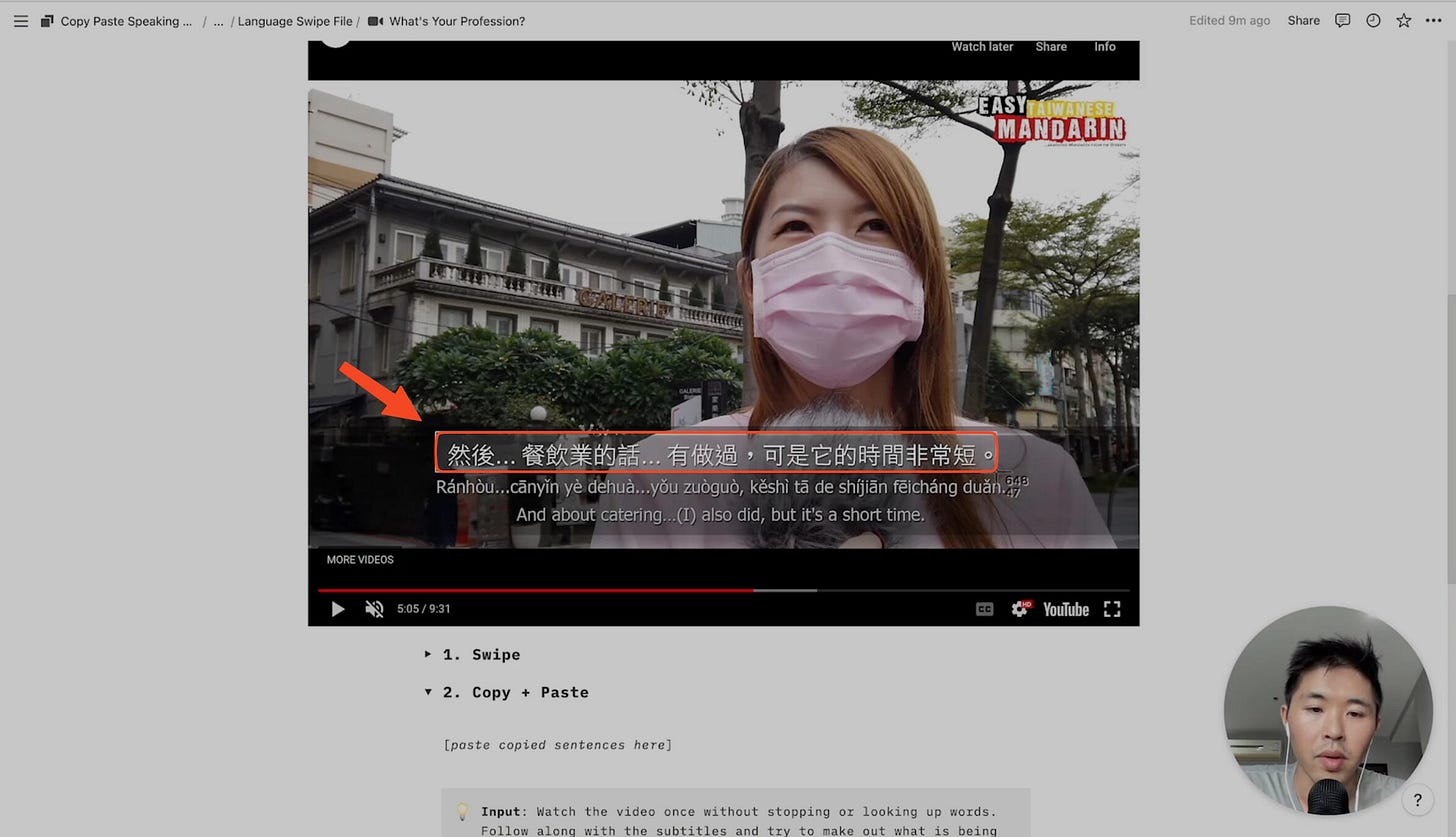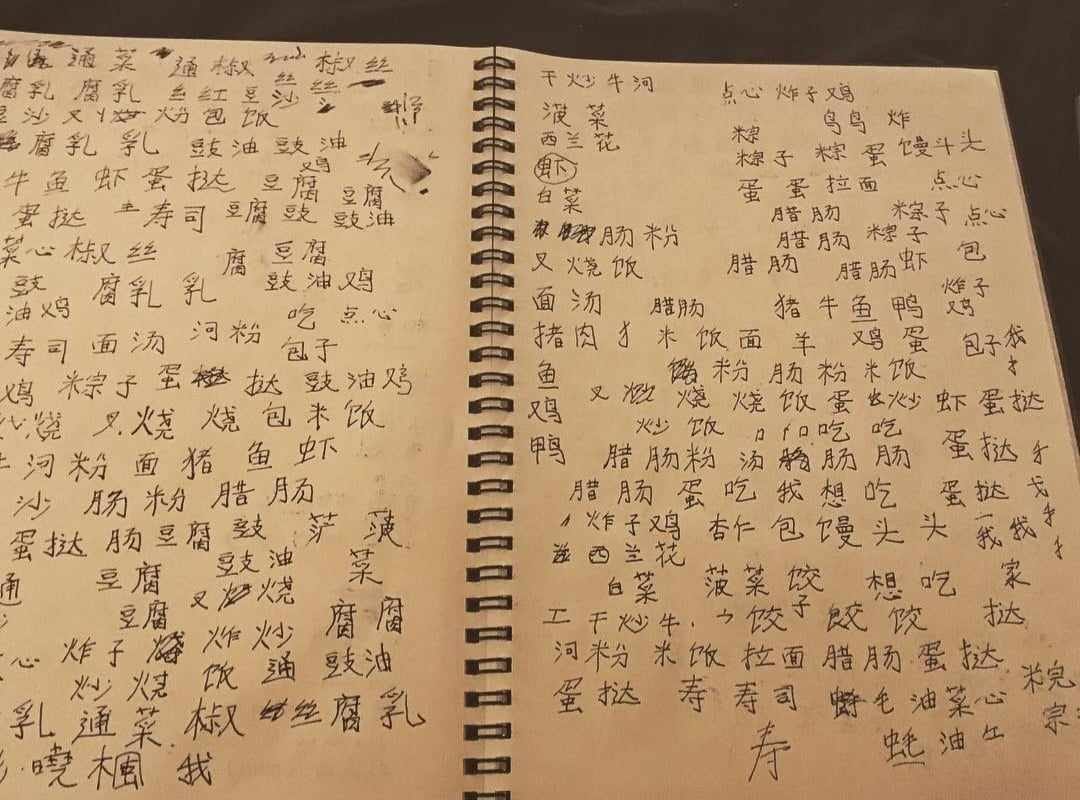How to make vocabulary stick
I met with a new student today and asked her about her main challenge with learning Chinese. She said two things:
“I don’t have enough vocabulary.”
“I can’t remember the vocabulary I learned when I speak.”
Sound familiar?
This is a VERY common problem that I hear all the time.
Unfortunately, many learners go about trying to fix it the wrong way which can actually make the problem worse.
Today, I’ll show you how I solved the “vocabulary” problem and how this helped me speak better Chinese.
What’s the REAL problem?
“I don’t have enough vocabulary.”
I think most of us have felt what this student told me; the feeling that we are learning a never-ending mountain of vocabulary that does not stick and does not come to mind when we need it (e.g., when speaking).
How do we deal with this?
Pile on more vocabulary? Spend more time studying the vocabulary?
This might be the common approach but it’s not the most effective.
Because the quantity of vocabulary is not the problem here.
The root of the problem is not exposure. I reckon you’ve been exposed to loads of vocabulary already. But you don’t feel like you know enough because you are not learning the right vocabulary.
It’s about the quality of that vocabulary.
You can start speaking and having conversations with a very limited amount of useful vocabulary.
I made this mistake for a very long time. I thought the more vocabulary I studied, the better off I would be. But the problem was that I was spreading myself thin.
I was learning all this vocabulary superficially, but I was not internalizing it. I didn’t know how they could be used in real life. I didn’t know what they would look like in a real sentence. I had never heard native speakers use them. I didn’t know if they were common vocabulary that would sound natural being used in daily conversation or if they were uncommonly used.
So, how do you learn the right vocabulary?
Learn from the right input
The alternative is to start with real material by native speakers like podcasts, vlogs, street interviews, etc. This solves all the problems of learning from isolated vocabulary lists.
You learn the vocabulary in sentences, giving you context on how it can be used in real life
The vocabulary is used by native speakers, which means it’s common and colloquial enough for you to use
Hearing or seeing the speaker use the vocabulary in real life provides further context (tone of voice, environment, context of dialogue, etc.) to enhance memory

When you focus on learning vocabulary that is used in real material by real native speakers, you guarantee they are high-frequency words. You won’t waste your time learning low-frequency words.
In other words, you focus on the best bang for your buck vocabulary.
This will keep you motivated and prevent you from feeling overwhelmed and burnt out as a beginner or intermediate learner.
I show you how to find the best real-world material and implement this practically in the Copy Paste Speaking Course.
Focus on one word a day
One trick that helped me immensely was to give myself the goal of only learning one word a day.
I don’t mean that I only allow myself to be exposed to one word a day and call it a day. I can still look up words here and there and learn words passively as I’m consuming that real native material. But I’m not going to try too hard to remember all those vocabulary words because I know there are diminishing returns the more vocabulary I try to learn.
Instead, I’m going to pick one vocabulary word every day that I think is important and common, and I’m going to REALLY learn that one vocabulary word.
For example, today it could be the word 决定, which means “to decide”.
I’m going to look it up, break down the characters in the word (決 and 定), figure out the individual components and radicals, and look up other words that their individual characters make.
I’ll also look at other example sentences with real speakers using youglish.com and, importantly, I’m going to try to use it and create my own sentences.
This way, I still learn a bunch of passive vocabulary that I will see over and over again throughout my learning journey, but every day I’m learning one word actively and deeply and I know how to use it in and out.
When it comes time to speak, it's much easier to remember and use words that I've learned deeply, but I also have the passive vocabulary for comprehension.
Imagine doing this every day for a year; that’s 365 vocabulary words that you know deeply. Imagine if all of them were super common and high-use vocabulary, plus you have all that passive vocabulary to help you as well.
How much more confident in your speaking would you be?
So, how do you use the vocabulary you learn?
Apply what you learn
“I can’t remember the vocabulary I learned when speaking”
That’s because you’re not applying what you learn. Most people read off a vocabulary list, maybe do some boring exercises, and that’s it.
There’s no real-world application. There’s no application that is interesting to your life, that relates back to your life.
That’s the missing piece that completes learning.
Knowledge is only half of learning. Application is the second and often overlooked half. And for good reason, because it’s often harder.
It’s much easier to add more input and exposure in the comfort of your own home. It’s a lot harder to go out and output, and apply and risk embarrassment or ambiguity.
So, we need to make application easy and frictionless to do.
I do this by thinking of my “one word” throughout my day, reminding myself occasionally and saying it out loud.
I try to think of different ways you could use it in a sentence throughout my day.
Going back to our example, 决定, I might say 我今天决定了学习中文, which means today I’m deciding to learn Chinese.
It doesn’t have to necessarily even make sense. The point is to use the word as much as possible in different situations and sentences to increase your contact and context with the word.
If you can’t think of anything you can look up sentences that native speakers have said in the past using this word with Youglish.com and copy them, and repeat this sentence throughout the day or slightly modify it to make it more personalized to yourself.
Another effective method I use is recording myself speaking which I teach in detail in the Copy Paste Speaking Course.

The more you think about it throughout the day, the more you are engaging in “active recall” and “spaced repetition,” both of which are highly correlated with increased memory retention and learning.
Doing this will increase the frequency by which you encounter this word and thus increase your chances of remembering it in the future when you need it because you’ve already started the process of creating sentences and using it in different scenarios.
Moving Forward
Let’s return to our original problems:
“I don’t have enough vocabulary.”
Solution: Learn the right vocabulary
“I can’t remember the vocabulary I learned when speaking.”
Solution: Actively learn and apply one word a day
Instead of brute force learning a lot of vocabulary superficially, I focused on the root problem.
By learning the right vocabulary I didn’t feel like I didn’t have enough vocabulary because there was always an easier way to say something using the vocabulary I already knew.
By actively focusing on one word a day and applying what I learned, I found it much easier to recall vocabulary when I needed it when speaking.
If you want to practical and actionable system to help you implement this, check out the Copy Paste Speaking Course where I show you how I find the best real-life material, learn the right vocabulary, and improve my spoken Chinese.
加油加油,
Danyo
PS Here are some practical ways I can help you level up your Chinese:
Copy Paste Speaking Course: This course will teach you a better & faster way to learn to speak Chinese by copying native speakers talking about real things, making real sentences, and speaking from day one.
Language Learner OS: This is a digital system to help organize your language studies, track vocabulary, build connections, stay productive, and learn faster!
I want to make The Mando Press even more useful for you so please reply or leave a comment on topics you want to see in future posts!
Refer friends, get free rewards!
If you’re enjoying The Mando Press, will you take 6 seconds and forward this edition to a friend?





